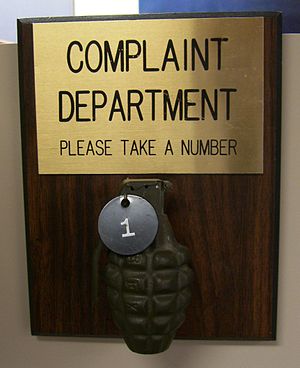 Complaint Department Grenade (Photo credit: Wikipedia)
Complaint Department Grenade (Photo credit: Wikipedia)This is the eighth installment in a multi-part series on procedural safeguards under the federal special education law, the Individuals With Disabilities Education Act. I work a lot in this area, so it is near and dear to my heart. Despite the importance of procedural safeguards. however, many issues are not fully understood. Please keep me posted as to your reaction to the series.
State Complaint Procedures (NOTE these are different from due process complaints which lead to due process hearings; these are complaints investigated by the state department of education. More on due process complaints in a later installment of this series.)
Each state education agency must maintain a state complaint procedure. 34 C.F.R. §§300.151-300.153. OSEP has stated that the state complaint system is required even though Congress has not specifically provided or addressed a state complaint system in the IDEA. 71 Fed. Register No. 156 at page 46606 (August 14, 2006).
Within one year of an alleged violation of the Act, any entity may file a state complaint. 34 C.F.R. §§300.151-300.153. A ruling is required within 60 days subject to extension for exceptional circumstances or an agreement to mediate. 34 C.F.R. §300.152. Only agreement, and not consent, is required to extend the 60 day time limit for processing complaints. 71 Fed. Register No. 156 at page 46604 (August 14, 2006). Here is an analysis by the Regional Resource Centers concerning how the exceptional circumstances exception should be applied. Where a state complaint and a due process hearing are requested on the same topic, the complaint investigator must set aside the portion of the complaint being addressed by due process until the hearing officer issues a decision. 34 C.F.R. §300.152(c). 71 Fed. Register No. 156 at page 46606 (August 14, 2006).
Where a state complaint investigator finds that IDEA has been violated, a corrective action is ordered. The relief that may be awarded includes compensatory education and reimbursement. 34 C.F.R. § 300.151(b). The purpose of this change to the federal regulations in 2006 was to make it clear that states have broad flexibility in awarding an appropriate remedy in resolving state complaints. 71 Fed. Register No. 156 at page 46602 (August 14, 2006).
When a state has finished processing a state complaint, a party who disagrees with the result may file a due process hearing complaint on the same issue if the statute of limitations has not passed. 71 Fed. Register No. 156 at page 46607 (August 14, 2006).
Here is the OSEP Topic Brief on State Complaint Procedures:

















I think my overall reaction is that, while it’s nice to see such legislation explained in-depth... one can’t help but wish we lived in a world where protection for those with disabilities, however severe, didn’t have to exist. Where people and businesses just helped, without any sort of litigation, those who face challenges. Then again, I suppose decency isn’t an inherent human trait always...
ReplyDeleteSarah,
ReplyDeleteThank you for your comment.
Great thought.
JG
Well, I grew up in a school where, quite frankly, lawsuits regarding this sort of thing should have been filed. It disgusted me. Teachers, even, screaming at students with obvious needs in front of the class for an inability that they could not help. I'd love to think teachers may also read your posts and learn something, but sadly I'm not sure that will happen.
ReplyDelete